
by Paulette Marshall | Aug 28, 2023 | Tax Preparation, Tax Resolution
Neglecting to pay your taxes can lead to serious consequences, and one of the most severe repercussions is the federal government filing a legal claim against all your current and future property through a federal tax lien.
In this article, we’ll break down what a federal tax lien is and provide guidance on what steps you should take if you receive a certified letter indicating that you have one.
Please note that it’s always advisable to seek the assistance of a specialized Tax Resolution Professional who can negotiate with the IRS on your behalf. If you’d like to schedule a free and confidential tax relief consultation, please contact us through our contact page www.actiontaxrelief.com.
What is a Federal Tax Lien?
A federal tax lien is a document filed with a county government (usually where you reside or conduct business) to notify the general public that you have an outstanding federal tax debt.
How Does It Affect Your Assets?
A tax lien attaches to all your assets, including property, securities, and vehicles. It also extends to any assets you acquire in the future during the duration of the lien.
If you sell any property while a federal tax lien is in place, the IRS will be paid before you receive your share.
How Does It Affect Your Credit?
Once the IRS files a Notice of Federal Tax Lien, it becomes public record. Credit reporting bureaus often pick up this information, which means that the federal tax lien will eventually appear on your credit report and could hinder your ability to obtain credit.
How Does It Affect Your Business?
A tax lien attaches to all your business property and rights to business property, including accounts receivable. This can significantly impact your ability to run your business normally and put you further behind.
What About Bankruptcy?
Filing for bankruptcy does not automatically eliminate your tax debt or the Notice of Federal Tax Lien. These obligations may persist even after the bankruptcy process.
Is a Lien the Same as a Levy?
The terms “lien” and “levy” are often used interchangeably, but they have distinct differences. A federal tax lien represents the government’s legal claim or interest in all your property. However, the IRS does not sell off or forcefully confiscate your assets. Nonetheless, having the IRS place a chain on everything you own can certainly make your life significantly more challenging.
A levy, on the other hand, refers to the enforcement of the lien through the collection of taxes. This can include actions such as seizing funds directly from your bank account or garnishing up to 75% of your net paycheck.
What Should You Do Next?
According to the IRS website, “Paying your tax debt in full is the best way to get rid of a federal tax lien. The IRS releases your lien within 30 days after you have paid your tax debt.” However, for most people, writing a check for the full amount is not feasible. This is where a tax resolution specialist can be of assistance.
Contrary to the IRS’s advice, your initial step should be to contact a qualified tax resolution professional, such as ourselves. Dealing with the IRS on your own is like going to court without a lawyer—it’s possible, but your chances of achieving a favorable outcome are slim.
A qualified tax resolution expert can create a resolution plan, immediately communicate with the IRS on your behalf, and initiate negotiations to alleviate your tax problem.
Feel free to reach out to our firm, and we’ll be happy to schedule a confidential consultation without any obligation. During this session, we’ll explain the options available to you for permanently resolving your tax problem at www.actiontaxrelief.com.

by Paulette Marshall | Aug 22, 2023 | Tax Preparation, Tax Resolution
Dealing with tax debt can be incredibly intimidating. It’s natural to feel overwhelmed and powerless in such a situation, but it’s important not to let fear and helplessness paralyze you.
Every day you delay taking action, interest and penalties continue to accumulate, potentially causing your liabilities to skyrocket and wreak havoc on your financial stability. In this article, we’ll discuss one of the many available options for tax relief called an “Offer in Compromise.” But before we delve into that, if you’re facing a tax problem, get in touch with our firm to schedule a consultation at www.actiontaxrelief.com.
What Are Your Options?
Even if you believe it’s impossible to repay what you owe, it’s crucial to explore all available repayment options. While the IRS may be a formidable collection agency, they can be surprisingly reasonable when it comes to repaying back taxes and settling long-standing debts.
If you owe back taxes to the IRS or have unfiled tax returns from previous years, you may qualify for programs that make it easier and faster to pay what you owe. One such program is the offer in compromise, which allows eligible individuals to settle their IRS debt for significantly less than the full amount. However, qualifying for this program can be complicated, so the best way to determine your eligibility is by contacting our firm today [insert your contact page link].
An offer in compromise is a well-known but often misunderstood part of the tax code, and navigating its complexities can be challenging. Not all taxpayers will qualify for the offer in the compromise program, and even those who do may struggle with the intricacies of dealing with the IRS.
This is why it’s crucial to work with a tax resolution expert when you have back taxes. Without an expert on your side, the IRS may reject your offer for a compromise, and the amount you owe could keep increasing due to additional penalties and interest.
If you’ve received a tax due notification from the IRS, you can’t afford to wait. When the tax agency wants their money, they want it immediately, and without an offer in compromise, your options may become severely limited. The longer you wait, the more challenging your situation may become. However, hiring the right tax professional—one who specializes in dealing with the IRS—can turn things around.
An experienced tax resolution specialist possesses comprehensive knowledge of all IRS programs, including the offer in compromise option. Even if you don’t qualify for an offer in compromise, a tax relief expert can help you explore alternative options, allowing you to settle your debt while still having enough money to sustain your life.
Few things in life are as daunting as owing money to the IRS. When that notice arrives in your mailbox, it’s easy to panic and do nothing. However, this situation demands prompt action. The faster you act, the easier it will be to find a qualified professional who genuinely cares about your best interests. Once you’ve connected with a reputable tax resolution firm, you can work towards paying off your debt, achieving a fresh start with the IRS, and finally putting this unfortunate chapter of your financial life to rest.
If you’re facing tax troubles, reach out to our tax resolution firm, and we’ll schedule a free and confidential consultation to explain your options thoroughly and help you permanently resolve your tax problem at www.actiontaxrelief.com.

by Paulette Marshall | Aug 1, 2023 | Tax Preparation, Tax Resolution
Filing your tax return accurately is crucial to avoid unnecessary tax troubles. However, it’s not uncommon to discover errors or overlooked information after you’ve already filed. Fortunately, the Internal Revenue Service (IRS) allows taxpayers to amend their returns using Form 1040X.
In this blog post, we’ll explore how amended tax returns work, the importance of seeking professional assistance, and how our firm can help you navigate the complex world of tax resolution.
Uncovering Missed Income and Deductions:
Sometimes, taxpayers file their returns only to realize later that they omitted certain sources of income, such as earnings from temporary jobs or side gigs. This oversight becomes apparent when they receive a 1099 or a late W2 form indicating the income earned. Similarly, others may discover they were entitled to additional deductions or exemptions. For such cases, amending your tax return is the appropriate course of action.
Understanding the Timeframe:
The IRS allows individual income tax returns to be amended up to three years after the original return’s due date. Form 1040X is the official document used for amending returns. While you can file an amended return on your own, it’s strongly recommended to consult a tax resolution professional. They possess the expertise to handle multiple years of unfiled tax returns, potentially negotiate reduced payments, and save you from unnecessary headaches.
The Amended Tax Return Process:
Not all errors require filing an amended return. The IRS automatically corrects simple math mistakes. However, when there’s a need to change filing status, income, allowable deductions, or credits, filing an amended return is essential. To initiate this process, you’ll need to complete Form 1040X, which cannot be electronically filed. This is where the expertise of a tax professional becomes invaluable, as they can guide you through the intricacies of the form.
Proper Documentation and Explanation:
When completing Form 1040X, each amended tax year requires its own separate form, each of which must be mailed in its own envelope. The form provides space to explain the changes made, and it’s important to clearly state the line numbers and reasons for the amendments. While you don’t need to attach a copy of the original return, any additional IRS forms or supporting documents must be included to substantiate the changes.



